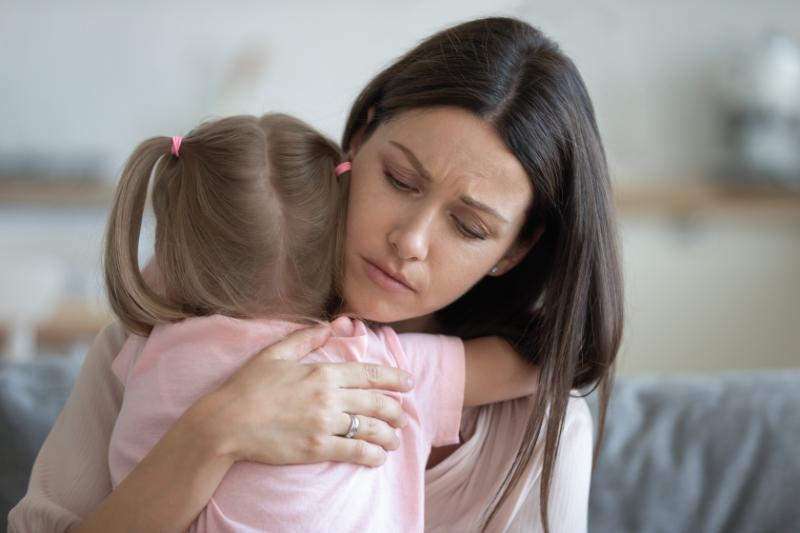Anxiety is among the most common psychiatric conditions in young people, affecting nearly 1 in 12 children and 1 in 4 adolescents.
Having constant mood swings and being easily irritated may be a natural behavior among kids and teenagers. However, some signs could help you recognize cases when these issues may be more than just a tantrum or a phase.
When such behavior starts to appear more frequently, and additional issues like worsening performance in school or sleep disturbances show up, it could mean your child might be dealing with anxiety.
Recognizing signs of anxiety in time can help reduce the impact on their behavior and reduce the need to use medication.
A child can manifest anxiety in different ways, including physical or behavioral signs.
Physical signs of anxiety may include:
- Frequent stomach aches or headaches
- Racing heart
- Shortness of breath
- Gastrointestinal issues like nausea and vomiting
- Irritable
- Sleeping either too much or not enough
- Frequent nightmares
- Fatigue
- Being unable to sit still
- Frequent tantrums
Behavioral signs of anxiety can include:
- Mentioning irrational fears or worries
- Becoming isolated and avoiding friends
- Worsening performance in school
- Skipping responsibilities
Anxiety can be caused by a variety of factors beyond regular stressors, including:
- Genetics: If your family has a medical history of anxiety or other mental health conditions, your child may be more susceptible to it.
- Brain chemistry imbalances: An imbalance in brain chemicals, like epinephrine or serotonin, can lead to anxiety in children.
- Stress: Ongoing stress from school or extracurricular activities could lead to the development of anxiety disorders.
- Traumatic experiences: Suffering a traumatic event at a young age, even if it was a long time ago, could cause the development of anxiety.
- Recent life changes: Major events like moving to a different city, changing schools, or losing a loved one could significantly affect a child’s behavior.
- Bullying or issues in school: Having academic difficulties or dealing with bullying can be a major source of stress for children.
Not all children experience anxiety similarly. Anxiety may range from generalized anxiety disorder to phobias and selective mutism.
Generalized anxiety disorder (GAD) is characterized by a persistent worry that gets in the way of daily activities. Your child may find it difficult to focus when talking or doing schoolwork
This ongoing worry can lead to physical signs like trouble sleeping, frequent nightmares, and restlessness.
Children with social anxiety disorder may find it hard to engage in activities with children their age, participate in class, or speak to others besides their close family members.
Specific phobias in children often appear as irrational fears of particular situations, people, or objects. This can include:
- Nature - Fear of heights, waterfalls, or thunderstorms
- Animals or insects - Fear of spiders, ladybugs, dogs, or cats
- Situations - Fear of going to school, shopping, etc
- Others - This may include fear of clowns or other objects
Although having an emotional attachment to an object like a blanket or teddy bear is entirely normal, separation anxiety disorder causes extreme reactions when separated from their comfort toy or item. This can include:
- Intense tantrums
- Inability to leave home without the object or person
- Shortness of breath
- Dizziness
Selective mutism is a type of anxiety that happens when a child can speak freely in specific places, like at home with family but has difficulty speaking in school or other social settings.
Children and teenagers who suffer from anxiety usually show major improvements when using an integrative approach to their treatment. This may involve therapy, holistic strategies, and medication in some cases.
Therapy aims to reduce the occurrence and intensity of anxiety symptoms by the gradual exposure to situations or objects that trigger stress in a controlled setting. Some of the most common and effective kinds of therapy used to treat mental health conditions in children include the following:
- Cognitive Behavioral Therapy (CBT) helps connect thoughts, feelings, and behaviors.
- Exposure and Response Prevention (ERP) helps identify and gradually face their fears.
- Acceptance and Commitment Therapy (ACT) combines self-acceptance and mindfulness meditation to address fears without avoiding them.
Your healthcare professional will always use therapy as a first option to deal with any mental health issues your children may be dealing with. If extreme worry and behavioral changes appear, they may suggest trying medication to help improve symptoms.
Medications are usually some kind of selective serotonin reuptake inhibitors, which help reduce stress levels and physical symptoms while also managing sleep disorders.
Coping strategies and meditation techniques that could help your child deal with stress and anxiety include:
- Meditation
- Eating nutritious meals and limiting sugar intake
- Regular exercise
- Healthy sleeping patterns, including less screen time before bed
- Deep breathing exercises


